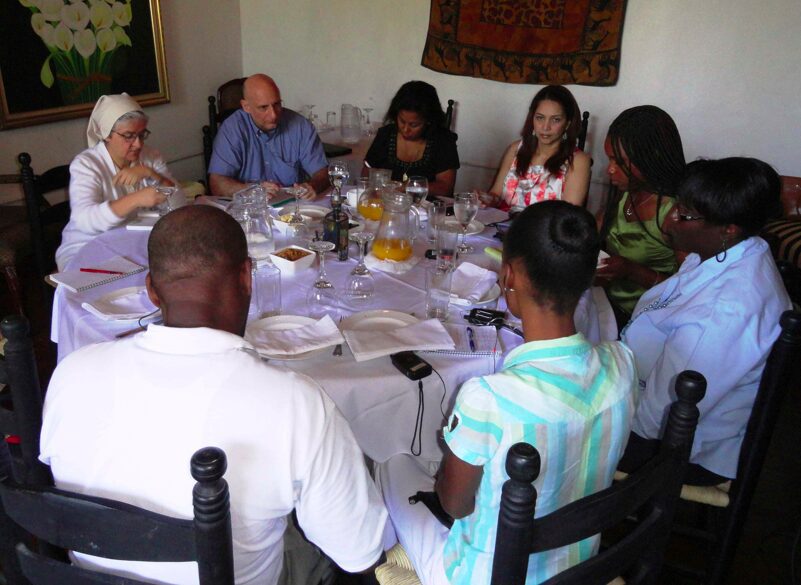 Port-au-Prince, Haiti—As the rainy season began in this Caribbean nation of nearly 10 million people, heads of the Vincentian family branches in Haiti gathered for a work session March 16, 2012 to refine their approach to breaking the cycle of poverty.
Port-au-Prince, Haiti—As the rainy season began in this Caribbean nation of nearly 10 million people, heads of the Vincentian family branches in Haiti gathered for a work session March 16, 2012 to refine their approach to breaking the cycle of poverty.
The Rev. Joseph Agostino, C.M., Vincentian family coordinator for the Haiti Project, traveled from Philadelphia, Penn., to participate. He assumed leadership of the project in January following a meeting in Rome where the international leaders of the Congregation of the Mission, Daughters of Charity, Society of St. Vincent de Paul and International Association of Charities asked him to succeed the Rev. Robert Maloney, C.M.
“It was a good start,” said Father Agostino of his first meeting with the group. “They asked for three things: financial resources for jobs, a support system around ultra-poor families and educational opportunities for youth.”
The working group will take these ideas and move them toward two goals: integrating them with the two-year-old Vincentian micro-credit and small business initiative called Zafèn and exploring supplemental ways to empower Haitians living in poverty who are not candidates for individual entrepreneurship.
Vincentians of Haitian descent and those with many years of experience in the country painted an authentic picture of the situation on the ground at the meeting. Sister Rosa Maria Sanchez of the Daughters of Charity in Cité Soleil, a significantly disadvantaged area in the capital city, noted that it is easy to get lost attempting to alleviate poverty and misery here, yet the sisters run a garment factory that is providing job skills and income generating activities for local women.
“Every country has poverty, but Haiti is different because the governm ent doesn’t help the people,” said Jackie Casseus of the International Association of Charities in Haiti. “It doesn’t listen or do much to help the poor.”
“The poor are our masters; we are their servants. That’s the mission of the society,” according to
Elismé Lesley, president of the Society of St. Vincent de Paul’s National Council of Haiti. “Feeding the poor is not enough. We need longer term solutions to give them a voice in society. We need concrete results and productive projects.”
Jocelyn Duval, president of the Vincentian Marian Youth in Port-au-Prince, advocated for young adults stymied by their circumstances. “Our goal is to help young people learn a skill and find a job.”
Also attending the meeting were Régine Theodat, Vincentian family project director based in Haiti, and Griselda Garibay, Vincentian family administrator for Zafèn, and Denise Mattson, Zafèn project communication, who are based at DePaul University in Chicago, Ill.
As he listened to the needs assessment, Father Agostino said, “We must find a way to coordinate the work of the family’s many branches so we can succeed on this project together. The focus of these efforts should be on people most in need, people who we are sent as ministers to serve.” Yet he recognized that members of the Vincentian family are in need themselves and acknowledged that efforts must be made to support them as well.
He left the group with encouragement, reminding them that “We are God’s servants of his poor. We come with our love and we, ourselves, are a resource.”
Photo Identifications
Vincentian Haiti Group at work table
From left: Sr. Rosa Maria Sanchez, Daughters of Charity; Fr. Joseph Agostino, C.M., Vincentian Family Coordinator for the Haiti Project; Suzie David Pierre, Haiti Project Coordinator, Society of St. Vincent de Paul USA; Griselda Garibay, Vincentian Family Administrator for Zafèn; Régine Theodat, Vincentian Family Project Director; Jackie Casseus, International Association of Charities; Jocelyn Duval, President, Port-au-Prince Vincentian Marian Youth; Elismé Lesley, President, Society of St. Vincent de Paul’s National Council of Haiti
Tags: Agostino, Haiti, leadership, Zafen


